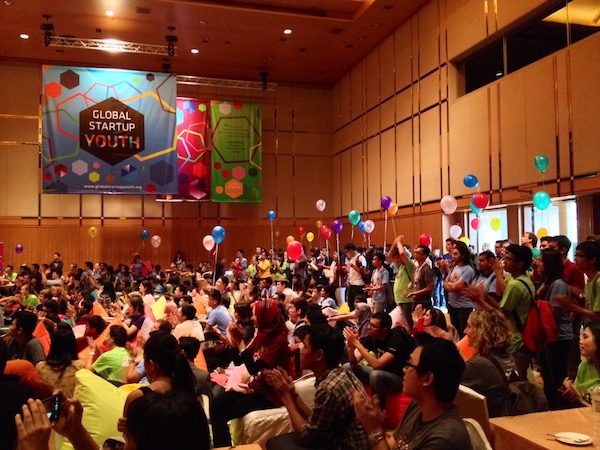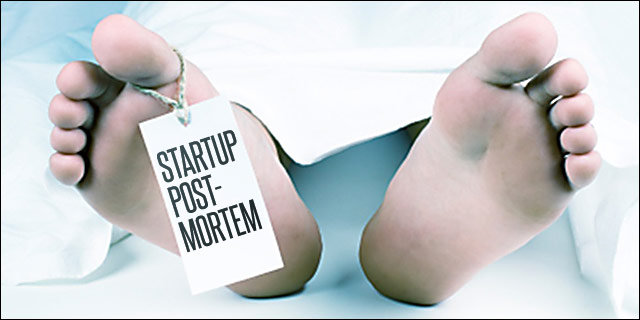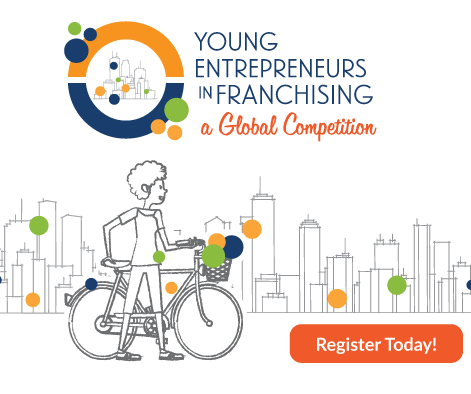In late November, Global Entrepreneurship Week (GEW) was celebrated around the world with the goal of inspiring millions to engage in entrepreneurial activities. The reach of this campaign is almost beyond comprehension:
- 10 million participants
- 140 countries
- 20,000 activities, events and competitions
- 10,000 partner organizations
This, all built in the past 5 years, and supported by world leaders.
My favorite thing about GEW is how many young entrepreneurs it touches, influences and impacts, and I’m compelled to write about it because this explosive ecosystem of support for young people with big ideas is so new. Most in the field today don’t even realize how new it is.
The photo here at the top, for example, comes from one of the most significant events for young entrepreneurs on record yet: Global Startup Youth (GSY), started by the founder of Startup Malaysia, Dash Dhakshinamoorthy. To kick off the Global Entrepreneurship Congress last month, young people from 100 countries came to Kuala Lumpur for a “hackathon” to build apps that could change the world.
 As we marvel at the scale of these new initiatives, I really think it’s important to remember how far we’ve come. And how much further we have to go with it all. Continuing to support programs like this is not just a way to address global unemployment, but address the fact that many of the new industries and opportunities that will employ us in the future, have yet to be built. In fact, in many ways, that future is in the hands of today’s young entrepreneurs. Looking at this field as an example underscores how lucky we are to be alive now, and how much opportunity there really is.
As we marvel at the scale of these new initiatives, I really think it’s important to remember how far we’ve come. And how much further we have to go with it all. Continuing to support programs like this is not just a way to address global unemployment, but address the fact that many of the new industries and opportunities that will employ us in the future, have yet to be built. In fact, in many ways, that future is in the hands of today’s young entrepreneurs. Looking at this field as an example underscores how lucky we are to be alive now, and how much opportunity there really is.
When I spoke to entrepreneurs in Hungary for GEW, I reminded them that despite the massive economic challenges we face, it is out of difficult times that entrepreneurs thrive the most. This is such a different world — and so much richer with possibilities — than when I started my first ventures as a teen and twentysomething.
Entrepreneurship is certainly no “trend” either, though I’ll never forget the day someone very big in the business world, whom I admired greatly, tried to convince me otherwise: “Jen, your audience [young business owners] is so small, it will never be significant enough to matter.” It was one of those pivotal life moments where I flat-out rejected the notion, committed to proving that young startups were fast on the rise, and show the world that young people could in fact change everything.
Throughout this year, I kept finding myself staring at the date for GEW, and couldn’t figure out why. Then it hit me: Exactly 20 years ago, we launched the first online community to connect and support young entrepreneurs globally. I was 19.
Entrepreneurship: 1990s Style
 In 1993, while I attended Boston University, I built the International Directory of Young Entrepreneurs (IDYE) with Ben Kyan and David Meadows, my original partners. It was a Fox Pro based membership directory distributed via mail on floppy disks, assembled with a team of interns on the floor of my first apartment. Our shipping costs were barely covered by the $36 annual fee we charged, not to mention the $800 phone bills we regularly incurred calling around the world to manually update member contact info.
In 1993, while I attended Boston University, I built the International Directory of Young Entrepreneurs (IDYE) with Ben Kyan and David Meadows, my original partners. It was a Fox Pro based membership directory distributed via mail on floppy disks, assembled with a team of interns on the floor of my first apartment. Our shipping costs were barely covered by the $36 annual fee we charged, not to mention the $800 phone bills we regularly incurred calling around the world to manually update member contact info.
Today any of us might snicker at the idea of sending a directory by “snail mail”, but back then there was no FTP, email, Google docs or any of the other online solutions we easily forget we lived without.
A year before we had staked our claim as the “#1 resource for young entrepreneurs in the world, connecting aspiring, emerging and successful young entrepreneurs”, I had what I like to call my “entrepreneurial coming out of the closet” at the Association of Collegiate Entrepreneurs (ACE) convention in NYC.
In a ballroom filled with hundreds of other young entrepreneurs buzzing around in suits with business cards and freshly printed brochures, I suddenly discovered I wasn’t alone in the world. I wasn’t so strange after all — something I’d felt since launching my first little venture at 13 years of age.
Michael Dell, founder of Dell Computers, was there to talk about his college startup story and urge us all to keep going. At age 30, he had just become the youngest Fortune 500 Company owner in history, and was an idol to us. John Katzman, founder of Princeton Review (who started a tutoring service from his dining room table as a student at Princeton, then cornered the market), taught us about Guerilla Marketing. He emphasized that we needed to be relentless in our pursuit of entrepreneurship, new business, and even our competitors. John got me so fired up, I chased him down in the hallway after his speech. We ended up talking for hours, and he became one of my very first mentors, eventually offering me my first opportunity to become an author with No Experience Necessary: the Young Entrepreneurs Guide to Starting a Business, one of the very first books written for young entrepreneurs.
That ACE conference was one of the very earliest gatherings of entrepreneurs who were fighting the widely prevalent stereotypes that young people weren’t capable of running real businesses. (And, as it turns out, the future COO of YSN was also in that room, but I’ll let Jennifer Iannolo tell you her own version.)
Those of us in that room knew better. We were doing it, surviving on Ramen noodles, working evenings and weekends instead of clubbing with friends, dodging questions from parents about why we weren’t getting better grades, and in the business world, tirelessly trying to earn the credibility and respect we desperately needed to close investors, clients and get our businesses off the ground and to the levels we knew they could grow to. Few people understood us as a group. We had to stick together. All I knew was I couldn’t let go of this network, and set off to start the UCLA and Boston University chapters of ACE over the months that followed.
In May of 1993, ACE collapsed. The all-student board was confronted with a crisis in the middle of final exams and graduations, and the organization never recovered. Other organizations were also being created or already in motion:
- The founders of ACE, led by Doug Mellinger, had already gone onto create YEO, The Young Entrepreneurs Organization, today known as EO. They were focused on supporting entrepreneurs under 30 years old who were doing over $1 million in sales.
- The Prince’s Youth Business Trust (now Youth Business International) in the UK
- NFTE, the Network for Teaching Entrepreneurship, started by legendary educator Steve Marriotti. His mission was to teach disadvantaged kids a new route to economic independence and hope. I first saw Steve at a little young entrepreneur event in NY and attacked him like he was Brad Pitt. (He still loves that reference and is one of my best friends to this day.)
- The Kauffman Foundation (creator of Global Entrepreneurship Week) was already making major investments in pushing the field forward.
- Magazines like Inc., Entrepreneur and Fast Company were starting to write some of the very earliest articles on the demographic. Rieva Lesonsky, former Editorial Director of Entrepreneur Magazine for 25 years became my other earliest mentor -and we could never have achieved half of what we did without her support all these years.
Steve Mariotti gave me the opportunity to host Inc. Magazine and NFTE’s first young entrepreneur video — on VHS tape. Back then, we had to feed the media stories of interesting young entrepreneurs because they were so hard to find. Over a few years we sourced over 400 journalists on people and trends we were seeing. Rieva at Entrepreneur launched the first 40 Under 40 series. I’ll never forget the first Forbes cover story on the topic either. We offered 5 of the 7 profiles because it was really that hard to find success stories. The article, when it came out declaring Young Entrepreneurs: The Most Entrepreneurial Generation Yet, was triumphant for those of us who had been kicking and screaming for people to pay attention to our audience for years.
Entrepreneurship: The New Trailblazers
Generation X might have blazed the initial trail, but today we have the next wave of young entrepreneurs taking the world by storm and forging extraordinary new paths. The Future of Entrepreneurship Education Conference, renamed the Empact Summit by creators Michael Simmons, Sheena Lindahl and Sarah Green did a brilliant job bringing together the biggest players in the entrepreneurial ecosystem for the first time. They even documented what it looks like brilliantly on their site.
Scott Gerber started the Young Entrepreneur Council. Matt Wilson and Jared O’Toole created Under 30 CEO. Brothers Matthew and Adam Toren started YoungEntrepreneur.com. Startup America, created by Steve Case, founder of AOL, merged with Startup Weekend and recently formed UP Global.
Incubators and co-working spaces are popping up in major cities everywhere, and young entrepreneur organizations are spreading like such wildfire around the world, they are too numerous to count. Startup Chile alone went from one event to hundreds in a matter of a few years. Now there’s even a network of national startup initiatives called Startup Nations. Major companies like Microsoft, Google, Dell and American Airlines are launching entrepreneurial support programs and campaigns, some even hiring “Entrepreneurs In Residence” to drive the initiatives. Even the UN is getting in on the action, saying they too want to learn to think and act more entrepreneurially.
How’s that for an evolution story?
We’ve come so far as a field, a market, a demographic, a population. Like U.S. Secretary of State John Kerry said at the Global Entrepreneurship Summit in Kuala Lumpur:
As your generation continues to invent and reinvent and push us forward, you will invariably hear a lot of people call you the leaders of tomorrow. But I got news for you: That sells you short. I know you’re not content to be relegated to the future – you are the present. You are the leaders of today. You are changing the world even as we speak. And I am confident that the rest of us are in your exceedingly capable hands.
In the audience were high level members of the White House, the U.S. State Department’s Global Entrepreneurship Program, and dozens of others from foreign ministries around the world who are carrying out directives from their respective leaders to support young entrepreneurs.
And President Obama expressed precisely why I and all of the people mentioned above are such proponents of entrepreneurship:
We do all this because we believe that whether you live in Kuala Lumpur or Kuwait or Kansas City, when you’re free to have your own ideas, pursue your dreams, start your own businesses, serve your communities, it isn’t just good for your nations; it means more prosperity and progress for us all.
I’ve always said that it’s the entrepreneurs who are best suited to find solutions — my bet is that they’ll even be the ones to solve global youth unemployment. Given what’s coming, and how well we understand the mindset of these world-changers, at YSN we’re rolling out a brand new initiative to help them achieve that goal: the Global Opportunity Marketplace, or GO. With it we are starting to connect talented, ambitious young people around the world with the opportunities they dream of but cannot find.
Now that masses of young people are becoming empowered globally, their fresh perspectives and crazy ideas on just about everything are playing a bigger and increasingly significant role in shaping the new world order : how industries, companies, governments, organizations, media and the education system can all work better, smarter, more efficiently.
Guess it’s a good thing the rise of young entrepreneurs wasn’t just a fad after all.




